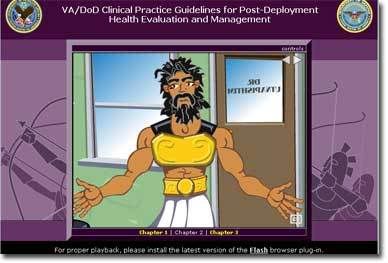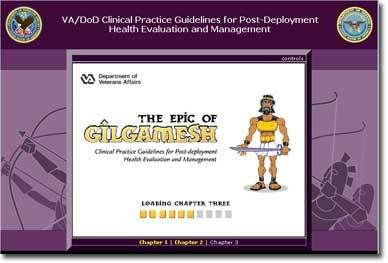A Peek Inside the Mind of the VA/DoD
I came by the following VA/DoD training video (it's actually a three-part Flash cartoon) by way of Nam Guardian Angel and VAWatchdog. I walk away from viewing The Epic of Gilgamesh as perplexed as they are by it.
The video, made to demonstrate some of the information inside the VA/DoD Clinical Practice Guidelines for Post-Deployment Health Evaluation and Management, is an interesting look into the VA/DoD mind. What are they thinking?
Click on 'Article Link' below tags for more...
The transcript for The Epic of Gilgamesh is only half as illuminating as watching the video itself, so I do suggest you do that as well, but I want to point out a few things that popped out at me as I watched it, as well as share what others had to say about it, too. I'm also interested in whatever comments you may have about the value and intention of this product of the VA/DoD directed at the medical caregivers of our returning troops.
From Larry Scott, VAWatchdog.org:
I'm not sure if I should be laughing or crying! But, maybe it's true: "A picture is worth a thousand words." Perhaps cartoon videos are remembered more easily than a dry "directive" printed on agency letterhead. Anyway...this is what VA and DoD are up to.
From the transcripts, the video begins:
Wars have plagued humankind throughout history. So it follows that illnesses related to combat are probably as old as war itself. Today, just as we have vastly superior medical practices for treating many common infectious diseases, we also have new approaches for treating war-related illnesses among returning combat veterans.
These new practices are summarized in the VA/DOD Post-Deployment Health Clinical Practice Guidelines. These guidelines are designed to help you -VA health care providers- as you begin to see veterans returning from combat and peacekeeping missions abroad.
To demonstrate these new guidelines, we have gone back to the classic epic of Gilgamesh, the warrior-king of Uruk, who was a legendary figure living nearly 5,000 years ago. The ancient city of Uruk where Gilgamesh ruled was located in Babylonia on the Euphrates river, in what today is modern Iraq.
Interesting choice of epics and regions to revisit, no?
The video goes on to explain the story of the Cedar War where "Gilgamesh and his companion-in-arms, Enkidu, decided to journey to the great Cedar Forest, and bring back all the cedar trees, which were very valuable at that time." Fear grips Gilgamesh and Enkidu before they even enter the forest, but they battle through it and return victorious after the fight.
But that's when their problems begin.
Gilgamesh and Enkidu began to have serious health issues upon their return. Enkidu fell ill and no one could determine the cause of his illness. The priests theorized that he had been singled out for vengeance by the gods because of his military experiences in the Cedar Forest. No more specific medical cause for his illness could be discovered, and after suffering from this mysterious illness, Enkidu died.
Gilgamesh, distraught with grief and denial over the death of his friend, wandered into the wilderness. Gilgamesh allowed his life to fall apart; he did not bathe, shave, or take care of himself.Soon, he began to realize that even though they won the war, he was losing his health. These thoughts sent him into a panic.
That's how the first of the three parts ends.
 The problems as I see them begin in Part II, where we are introduced to Gilgamesh's doctor, Dr. Utnapishtim, a man who continuously cracks jokes at the wounded warrior as if he were Groucho Marx. I wish I were exaggerating...as you can see from the screenshot, I'm not.
The problems as I see them begin in Part II, where we are introduced to Gilgamesh's doctor, Dr. Utnapishtim, a man who continuously cracks jokes at the wounded warrior as if he were Groucho Marx. I wish I were exaggerating...as you can see from the screenshot, I'm not.Now, I fully realize that humor is an important and necessary part of life (probably even one of the more important facets these days in our wounded world) but somehow this interchange between doctor and patient is jarring. Remember, this is supposed to be a training video for VA clinicians dealing with troops returning from combat with mental health issues.
Part II opens:
Seeking to become well again, Gilgamesh sought out Utnapishtim, the only human being who was granted eternal health by the gods.
What might Gilgamesh's encounter with a health care provider have been like using todays modern approaches to health care for veterans with war-related illnesses found in the Post-Deployment Health Clinical Practice Guideline?
DR. UTNAPISHTIM: Mr. Gilgamesh...
GILGAMESH: Dr. Utna...uh...Utna...pish...tim.
DR. U: You can call me Dr. U.
GILGAMESH: Dr. U?
DR. U: What about me? It's YOU we're here for, son.
GIL: Nooo, Dr. U?
DR.U: That's very nice. I appreciate your concern but this is about YOU, not me.
GIL: I said U.
DR. U: Well, we'll get to me, but first you.
GIL: And I thought I was sick.
GIL: Doc, I really need your help. Look at me, I used to be in great shape. I am a warrior-king, you know.
DR. U: I know I've got cable.
GIL: But after serving in the recent Cedar Woods conflict, I've really not feeling my old self.
DR. U: Well, Mr. Gilgamesh, do you think your problem today is possibly related to a military deployment?
GIL: I dunno. You're the doctor.
DR. U: Uh yes, well. Did horrible things happen to you during the Cedar Woods conflict?
GIL: Uh Doc, it was a war.
DR. U: Yes, of course.
GIL: I saw enemy soldiers beheaded! My friend Enkidu was paralyzed for no obvious reason when we arrived.
DR. U: Interesting.
GIL: And then after we got back, my friend got sick and the doctors couldn't figure it out.
DR. U: My.
GIL: Then he died. And I keep having terrifying dreams that keep me up all night.
DR. U: Well, let's see. It seems I just read about this on my computer.
GIL: What is it, doc?
DR. U: It's a electronic box with a keyboard that allows me to go online, but that's not important now.
At least there wasn't any mention of tubes. Sigh.
It goes back and forth like this through large sections of the interview with the patient. Some portions get down to business, the doctor outlining the points clinicians should make as per the VA/DoD Clinical Practice Guideline For Post-Deployment Health Evaluation and Management; for example, the importance of taking "a full occupational and deployment history, including hazardous exposures and other deployment-related information that could be relevant to the patient's health" or that "for a patient with debilitating symptoms that can't be diagnosed, after carefully ruling out any other underlying pathology, it's important to make sure that I get everything I need to fully evaluate and document your health status."
But as Part II closes out, another problem arises, one a bit more unnerving than Dr. U's Groucho routine.
DR. U: Your lab tests don't really show anything, so I'm afraid I can't formulate a diagnosis right now. But, I can see that you have serious medical signs and symptoms. I want to reassure you that this isn't really that uncommon, but we'll need to monitor your health for a while.
Kathie Costos raises the following concerns:
[W]ithout a diagnosis by the VA along with a disability rating, the veteran is "non-service connected" for the disability and as such they are not treated for free for the wound they received from combat. Congress passed the rule change which allows the VA to bill for treatment for any veteran without their rating and a recognized service connected disability. In other words, until the VA puts a label on a veteran, it doesn't matter to them where the wound came from. They could be sitting in a wheel chair without the legs that got blown off in Iraq and all the VA will see is the service connected disability rating in the system. No rating, they [don't] pay. Nice isn't it? Then when you take a veteran discharged a year or so before showing up complaining of the symptoms of PTSD and they will make them pay for the treatment unless the VA finally gives the determination of a service connected condition.

DR. U: Well, Mr. Gilgamesh, I've checked out everything, so I'd say you do have what these guidelines refer to as "medically unexplained symptoms."
GIL: Dr. U!
DR. U: What about me?
GIL: No, I mean U -never mind- look, does this mean I'm not going to get better!?
DR. U: Now, don't get alarmed! This is simply a term we doctors use to describe the sort of symptoms that made you come to me in the first place - the sort of symptoms that in many cases have no obvious clinical pathogenesis even after an thorough diagnostic evaluation.
GIL: English, doc?!
DR. U: I thought you spoke Urukian?
GIL: Doc!
DR. U: (MUMBLING TO HIMSELF) Maybe a little Sumerian, but English hasn't yet been invented.
GIL: DOC!
DR. U: RIGHT! Anyway, it's just a label. I'd like to suggest that we try and stay focused on your symptoms and their possible treatments, rather than upon the underlying medical terminology.
GIL: Look, doc, I'm a mess and you can't even tell me what's wrong! How can you treat me if you don't know what's wrong? Hey, I thought you were granted eternal health from the gods!
DR. U: Yeah, well, the media kind of blew that out of proportion.
Sorry, I didn't warn you about Groucho popping back in there like that. In the next scene, the doctor is seen thinking to himself.
Dr. U (aside): Hmm, well, these Guidelines tell me that maintaining a positive and collaborative clinician-patient partnership involves an open two-way dialogue -- especially when the diagnosis remains in doubt or when the clinician and the patient disagree about the diagnosis. I'm trying to communicate to my patient about his health concerns, but it seems like he is only becoming more distrustful. Of course, I can't blame him, it's hard to be credible to a patient with persistent unresolved health concerns. What do I do now?
DR. U: Of course, all these ideas will help me maintain my credibility while opening a two-way dialogue:
DR. U: Well, Mr. Gilgamesh, I assure you we will work together to address your problems. You are not alone. In fact, in approximately one out of three patients presenting with debilitating symptoms, no physical cause can be identified upon medical evaluation. I know these unexplained symptoms are distressing. But rest assured that help is available even though the specific cause for you concerns are not clear right now.
GIL: Is there anything I can do!?
DR. U: Absolutely. The guidelines have a lot of practical suggestions to keep us focused on improving your long-term health status.
GIL: Like??
DR. U: Simple things, like exercise, sleep, hygiene and a few less lattes in the morning.
DR. U: And it's important to know that more care is not always better care---it may even hurt. And you should rest assured that your medical workup showed no evidence of any catastrophic medical conditions. So put your mind at ease.
GIL: Well, doctor, it's frustrating that I can't be made well right away, but I sure appreciate your concern and help! You've given me some things to focus on.
 Whew!
Whew!No diagnosis for PTSD, but we see Gilgamesh closing out the training video lacing up his running shoes and in his jogging suit ready to exorcise those pesky unknown medical demons with exercise!
Larry Scott, again from VAWatchdog.org, whittles down the main point in seconds flat:
The real message of all of this is to get employees to go to the following sites:
I do wonder who got paid how much for doing this. And, I wonder if the amount of time used to watch the three-part "Epic" couldn't be better spent.
So, what should we do in response? Kathie Costos suggests:
Go watch the videos and then email your congressmen the link. Let them see what the VA is doing with the money they don't have to spend on our veterans. After all it is a new congress coming in now. The one who funded this kind of crap were voted out!
I'm simply left shaking my head after viewing this VA training video.
What do you think?
[See Daily Kos version for more comments on this post.]



